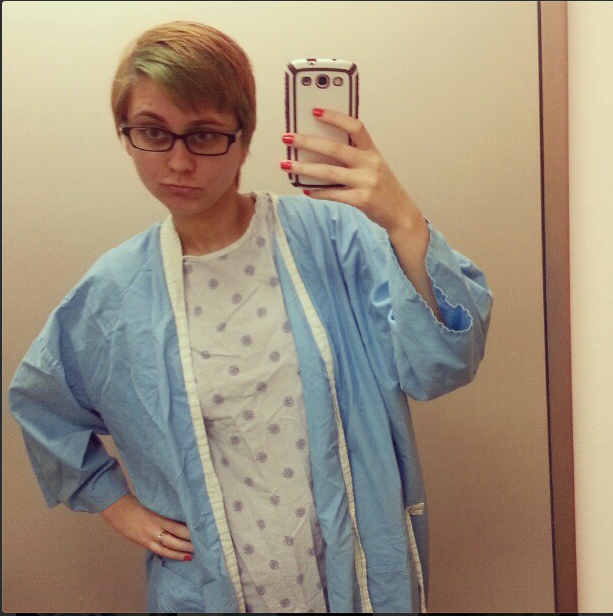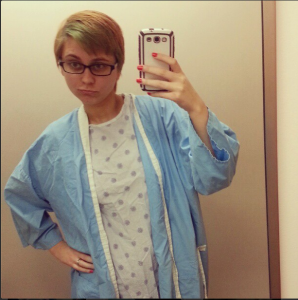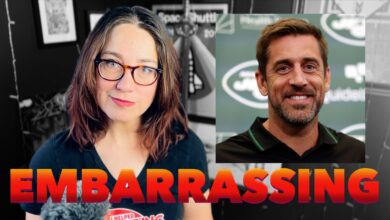Guest Post: Blog Against “Disablism” Day by Sarah Moglia

Our second guest blog today is from my friend and personal hero, Sarah Moglia, talking about invisible disability and how not to be a huge jerk friend to your newly disabled friends.
———
Disability. It’s one of those big, scary words that you think you know the meaning to. It’s one of those things that happens to other people, but not you. Well, until it does.
My disability isn’t an obvious one. I’m not in a wheelchair, I don’t use a cane or have something that you can immediately see. They call this an “invisible disability.”
My disability didn’t happen overnight. It’s not like I was in an accident and woke up disabled. It was a slope. I was always sick as a kid and in my teens, but doctors always chalked it up to “normal” things. “She just has a sensitive stomach.” “You just need to eat better.” “Take some stool softener and you’ll be fine in a week.”
My parents just figured it was me not eating well, or not getting enough sleep, or exercise, or whatever. I remember missing so much school that my guidance counselor called me in to ask if there were “problems at home.” No, I just have a “sensitive stomach,” that’s all.
Then I went away to college. I got docked points for missing so many classes. I remember I went to my school a week early for Resident Advisor training, but on the drive to school, my friend had to pull over every 20 minutes so I could puke on the side of the road. My nurse aunt told me to just eat some crackers, drink some Gatorade, rest, and I’d be better in a day or two. Just food poisoning. I remember waking up at 4 AM, screaming so much that my friend took me to the ER…where I got some fluids & was discharged. Just food poisoning…even though my friend, who ate exactly what I ate, didn’t have any reaction.
Finally, I graduated college, got a job (with benefits!), and moved to Ohio. By this time, I had 22 years of experience in dealing with my body. I assumed it was normal for people to immediately identify where a bathroom was whenever they went somewhere. My friends were used to me cancelling plans because I “ate something funny.” I left my own birthday party to go home and vomit.
A week after my 23rd birthday, I was diagnosed with Crohn’s Disease. I hadn’t even heard of it before. “Most people lead totally normal lives with Crohn’s,” my doctor assured me. A month later, I spent a week in the hospital because I had (what I now know is called) a flare up. That’s what sent me to the hospital in college, but since I didn’t have a diagnosis, they sent me home. A month after that, I found out I was having surgery (two, actually—a week apart).
I don’t think it hit me until I was at the hospital filling out registration forms before my surgery and the nurse helping me was trying to get me a private room. She called whoever’s in charge of that and said, “Can Sarah have a private room? She’ll be here for at least a week, she’s having a very serious surgery.” I knew I’d be there for a week, and in my mind I knew it was serious…but hearing a complete stranger say “she’s having a very serious surgery” just…scared me.
Surgery recovery went well…sort of. I got a pretty bad infection at the site of surgery, and then complications continued from there. The medicine they gave me to clear up the infection caused suicide ideation, so I had to be switched. More infections. More problems. More medications. Every week, I had to visit some doctor. I was going to the ER at least once a month.
I was trying to work full time while this was happening, too. It wasn’t until March, after I had two 5-day long stints in the hospital in 3 weeks that my partner gently suggested, “Maybe you should take a leave of absence at work for a while.”
I was hurt, but he was right. I’m just physically incapable of working right now. I’m…disabled. It’s weird to have that label. I mean, I went from being a “normal” person with a sensitive stomach to a person with a disease to…a disabled person.
So what can you do to support a disabled friend? Unless you’re very, very close, it’s unlikely that a disabled friend will ask you to do anything huge. There are things that you might not even think about but that could really help me! For example, some days I’m not up to driving…but I might still need a prescription refilled. Or maybe I need someone to help me look over paperwork. Really, the thing I could use most frequently is just company.
It’s the thousand papercuts that really hurt. You start to notice friends drifting away. Every conversation you have is about some new medication you’re on. You don’t get invited out anymore because people just assume you’re too sick to go out. You stop feeling like a person and start feeling like a disease or a disability. It’s not any one person’s fault, and I very much doubt they have malicious intent. The most common thing I hear is, “I just don’t know how to talk to you anymore.” Just because I’m disabled doesn’t mean I’m not a person! What did we talk about before I was Officially A Disabled Person?
In case you need some suggestions, here are some things to talk to me about: Have I played the new Bioshock game yet? (No, is it awesome as the hype makes it sound?) Who do I think is going to sit on the Iron Throne? (Dany, obv.) Have I read any good books lately? (Yes, The Sexual Politics of Meat, you should read it.) Did you hear that [some politician] said [this really awful thing]? (Rolling my eyes so hard they get stuck.) See? I’m still a person! I just have more limitations than I used to.
Sure, maybe I can’t go on a camping trip with you anymore—but that doesn’t mean I can hang out with you and play board games sometime! I can still do a lot of things, but if you do stop treating me like a person and start treating me like a disability, then we’ll never know, will we?

Sarah is a feminist, atheist vegan with Crohn’s Disease, and she won’t shut up about any of those things. You really need to follow her on Twitter at @mowgli3.
Featured Image: Sassy Hospital Chic selfie by Sarah Moglia





<3
that is all
+1
I really don’t have anything to add, but I’ll add it (the number 1) anyway. Is <4 one better than <3?
I love you and I officially toast to you with 50,000 units of vitamin D. It doesn’t really make a clink clink sound… more of a squish squish but the intent of sharing cheer is the same. (Do not try this at home, kids.)
I think BioShock Infinite is worth it. Also, so is following @mowgli3 on Twitter.
This is a terrific post. Many with invisible disabilities suffer far worse than those of us with large and well organized advocacy groups with lobbyists and all of that. Disabilities like yours (shared with the young skeptic-star Rhys Morgan) is often far more debilitating than blindness but we get so much more love. Really smart people with learning disabilities (dyslexia and such) work on loading docks at Target because they have no access to the kinds of technology we blind folks enjoy.
Thanks for writing this, the population of people with invisible disabilities need to be heard far more often!
I am very proud of you, Sarah, and pleased to be your friend.
Woohoo! The Sexual Politics of Meat is an excellent, excellent book!
Thank you for sharing your story, I have an invisible disability too (Meniere’s Disease) and I’m also an atheist vegan feminist! I was glad to see this :) Chrohn’s is serious stuff, good for you for taking this on head first and sharing your experiences
PS If you’d ever like to guest blog for me, I’d love it!
http://academicabolitionistvegan.blogspot.com/
This article is perfect. I have Graves Disease, and this article explains the problems of having an invisible disease. It really really spoke to my experiences, and the frustration of not only being sick, but having folks withdraw from you because they have no idea how to deal with you.
Have you read any of Natalie’s stuff on XOJane? She also has Chrohn’s disease, and writes about it quite a lot, it’s really interesting, but also sad, having an invisible disease sounds rubbish. Social anxiety is bad enough, but with the right anti-depressant and good therapy I’ve noticed a huge difference.
Sarah, you totally rock that hospital chic! Loved this article.
I love this, I have a serious case of Lyme disease, sometimes I walk around, sometimes I use a chair, a walker, a cane, and let me tell you the difference in how I’m treated is BIZARRE depending on which I use. Can’t people work 10% harder and just try to see people as persons first, and also not make assumptions, lol?
I look fit and young, I should be able to help you lift that table? I am healthy looking, so you better guilt me into avoiding the elevator? Come on people, we can be better than this.
I worked for a gastroenterologist with a special interest in Crohn’s and UC for ten years. When I first started working for her, I did not realize what a serious illness Crohn’s can be, because any time I’d ever heard of it, it was people who were relatively normal in terms of living their lives and not being sick very much. Certainly, there was still that type of patient in her practice, but over the years working there, my point of view really evolved, especially working with our very chronically flared up patients. These people were in and out of hospital for decades before I met them, sometimes for months at a time and sometimes even over a year, and will be in and out for their whole lives. Because of its invisibility, I found myself fighting for them to receive drugs like Remicade when it first came out, fighting for them to receive insurance benefits for being off work, advocating for them to their employers and even their family physicians for pete’s sake! I always feel angry when I hear that someone who was “sick their whole lives” and saw multiple doctors multiple times over many years including ER visits wasn’t sent for colonoscopy or CT or SBFT. Such easy tests, and nobody deserves to live with untreated Crohn’s. My heart goes out to anyone who has this serious diagnosis, because even though it doesn’t always impact people very negatively, the possibility is there and even if one is healthy at the moment, there is incredible anxiety for patients about the possibility of how bad it can be. I hope you are on some good treatment now which can help you stay in remission, and that you have good care. At the very least, it is better to live with the disease in our generation than our parents, because the availability of biologics means patients with chronic inflammatory diseases like IBD don’t have to be on chronic steroids.
It’s sad there is another person with an autoimmune disease, but nice to think there is another person who understands what it is like. I have been diagnosed with Psoriatic Arthritis, Psoriasis, Sjogren’s Syndrome, Microscopic Colitis, Spondyloarthropathy, and Hypothyroidism. I like to just call it Autoimmune Disease, since it’s all caused by the same thing. I hope they find a treatment that gets you into remission and improves your quality of life. My bowel problems got better when my Rheumatologist put me on Humira.